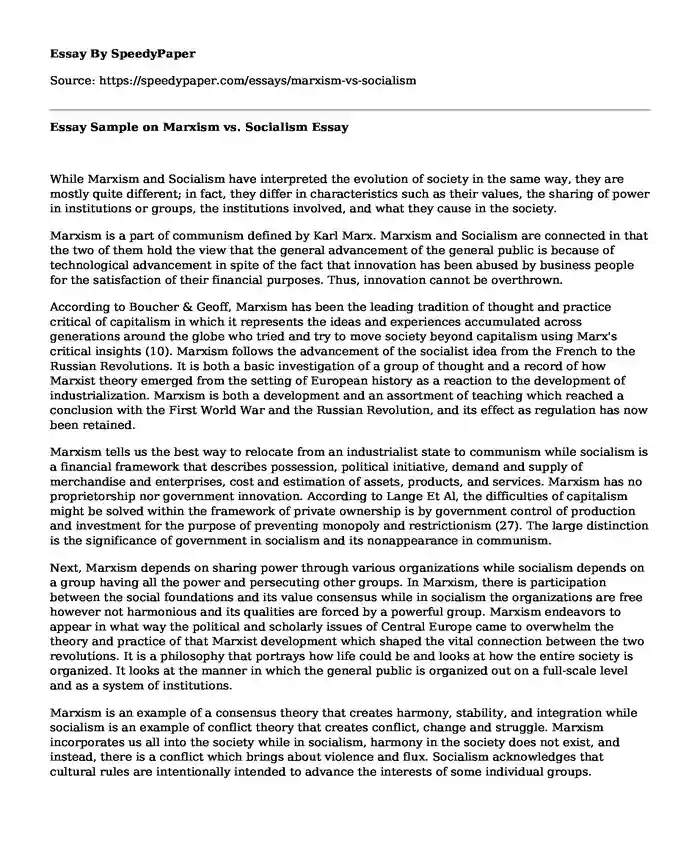
| Type of paper: | Essay |
| Categories: | History Capitalism Karl Marx |
| Pages: | 3 |
| Wordcount: | 737 words |
While Marxism and Socialism have interpreted the evolution of society in the same way, they are mostly quite different; in fact, they differ in characteristics such as their values, the sharing of power in institutions or groups, the institutions involved, and what they cause in the society.
Marxism is a part of communism defined by Karl Marx. Marxism and Socialism are connected in that the two of them hold the view that the general advancement of the general public is because of technological advancement in spite of the fact that innovation has been abused by business people for the satisfaction of their financial purposes. Thus, innovation cannot be overthrown.
According to Boucher & Geoff, Marxism has been the leading tradition of thought and practice critical of capitalism in which it represents the ideas and experiences accumulated across generations around the globe who tried and try to move society beyond capitalism using Marx's critical insights (10). Marxism follows the advancement of the socialist idea from the French to the Russian Revolutions. It is both a basic investigation of a group of thought and a record of how Marxist theory emerged from the setting of European history as a reaction to the development of industrialization. Marxism is both a development and an assortment of teaching which reached a conclusion with the First World War and the Russian Revolution, and its effect as regulation has now been retained.
Marxism tells us the best way to relocate from an industrialist state to communism while socialism is a financial framework that describes possession, political initiative, demand and supply of merchandise and enterprises, cost and estimation of assets, products, and services. Marxism has no proprietorship nor government innovation. According to Lange Et Al, the difficulties of capitalism might be solved within the framework of private ownership is by government control of production and investment for the purpose of preventing monopoly and restrictionism (27). The large distinction is the significance of government in socialism and its nonappearance in communism.
Next, Marxism depends on sharing power through various organizations while socialism depends on a group having all the power and persecuting other groups. In Marxism, there is participation between the social foundations and its value consensus while in socialism the organizations are free however not harmonious and its qualities are forced by a powerful group. Marxism endeavors to appear in what way the political and scholarly issues of Central Europe came to overwhelm the theory and practice of that Marxist development which shaped the vital connection between the two revolutions. It is a philosophy that portrays how life could be and looks at how the entire society is organized. It looks at the manner in which the general public is organized out on a full-scale level and as a system of institutions.
Marxism is an example of a consensus theory that creates harmony, stability, and integration while socialism is an example of conflict theory that creates conflict, change and struggle. Marxism incorporates us all into the society while in socialism, harmony in the society does not exist, and instead, there is a conflict which brings about violence and flux. Socialism acknowledges that cultural rules are intentionally intended to advance the interests of some individual groups.
Marxism clarifies everything regarding the manner in which it provides harmony and security to the present system of social order while socialism clarifies a few things in terms of how it causes advancement of the next phase of development. Socialism accepts that social order cannot be normally occur and therefore legitimacy has to be secured through influence and its qualities help to fortify the frameworks of misuse and mistreatment. Both Marxism and feminism are emancipatory theoretical traditions in that they envision the possibility of eliminating from social life certain forms of oppression (Wright, Erik & Erin, 211). The dominant organizations in the general public attempt to cover the abuse by endeavoring to convince people that the cultural rules are genuine and just.
From the above, we clearly establish how Marxism and Socialism differ in characteristics such as their values, the sharing of power in institutions or groups, the institutions involved, and what they cause in society.
Works Cited
Boucher, Geoff. Understanding Marxism. Routledge, 2014.
Lange, Oskar, Fred M. Taylor, and Benjamin Lippincott. On the economic theory of socialism. University of Minnesota Press, New York, and London, 1938.
Wright, Erik Olin, and Erin O. Wright. Interrogating Inequality: Essays on class analysis, socialism, and Marxism. London: Verso, 1994.
Cite this page
Essay Sample on Marxism vs. Socialism. (2023, Mar 23). Retrieved from https://speedypaper.net/essays/marxism-vs-socialism
Request Removal
If you are the original author of this essay and no longer wish to have it published on the SpeedyPaper website, please click below to request its removal:
- Finance Essay Sample on the Firm's Stock Returns
- Free Essay on Corporate Social Responsibility in Tata
- Free Essay with the Summary of the News Article Biting Into Aging Issue
- Free Essay with Text Analysis on Technology Impact on Learning
- Free Essay on Tourism and Climate Change
- Cultural Beliefs in Early Childhood Education
- Final Project Paper: Statistical Analysis Report in Mental Health
Popular categories




